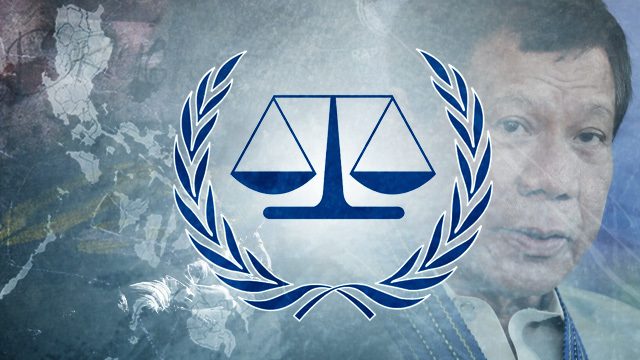SUMMARY
This is AI generated summarization, which may have errors. For context, always refer to the full article.

MANILA, Philippines – The International Criminal Court (ICC) on Tuesday, March 20, said it “encourages” the Philippine government to reconsider its decision to withdraw from the court.
“The Court regrets this development and encourages the Philippines to remain part of the ICC family,” said the ICC in a statement after it was officially notified by the United Nations (UN) of the decision on Monday evening, March 19.
On March 14, President Rodrigo Duterte announced that he had decided the Philippines should leave the ICC.
Duterte claimed that the ratification of the Rome Statute, the court’s founding document, was fraudulent.
He said the Philippines was “made to believe that the principle of complementarity shall be observed, that the principle of due process and the presumption of innocence as mandated by our Constitution and the Rome Statute shall prevail, and that the legal requirement of publication to make the Rome Statute enforceable shall be maintained.”
Calling the Rome Statute “criminal law,” Duterte said last Sunday, March 18, that he would urge other countries to “get out” of the ICC.
The ICC, however, said it is “fully committed” to the complementarity principle stated in the statute, adding that countries’ participation should be enlarged – not just maintained and reinforced.
“The Court remains fully committed to its independent mandate to help end impunity in a complementary manner with States, and in so doing, contribute to the prevention of future atrocities,” it said. (READ: ICC’s track record and what it means for Duterte and the PH)
Participation of countries in the Rome Statute, the ICC added, “is essential to global efforts to ensure accountability and strengthen the international rule of law.”
READ Rappler’s explainers:
Yes, Int’l Criminal Court can prosecute Duterte for killing spree
Police, military officials liable for Duterte’s illegal kill orders
What challenges will complaint vs Duterte face before ICC?
Jurisdiction retained
The Philippines’ move comes after the ICC’s Office of the Prosecutor announced it would begin a preliminary examination of the alleged crimes committed under Duterte’s war on drugs.
Duterte, however, said this was a “brazen display of ignorance of the law” because the court has “no jurisdiction” over the Philippines or him.
Critics have accused Duterte of trying to evade accountability for the high number of killings under his watch. Malacañang, however, said the President is not afraid.
Citing the case of Burundi, the ICC reiterated its previous reminder to Duterte that withdrawal from the court would not change a country’s obligation to cooperate in a proceeding which had already begun.
“As indicated recently in the ICC Pre-trial Chamber decision authorizing the opening of an investigation in relation to the situation in Burundi, the ICC retains its jurisdiction over crimes committed during the time in which the State was party to the Statute and may exercise this jurisdiction over these crimes even after the withdrawal becomes effective,” it said.
The court also highlighted that a withdrawal can only become effective one year after sending a letter to the UN, contrary to Duterte’s declaration that it is immediate. (READ: What the Rome Statute says about withdrawing from the Int’l Criminal Court) – Rappler.com
Add a comment
How does this make you feel?
There are no comments yet. Add your comment to start the conversation.